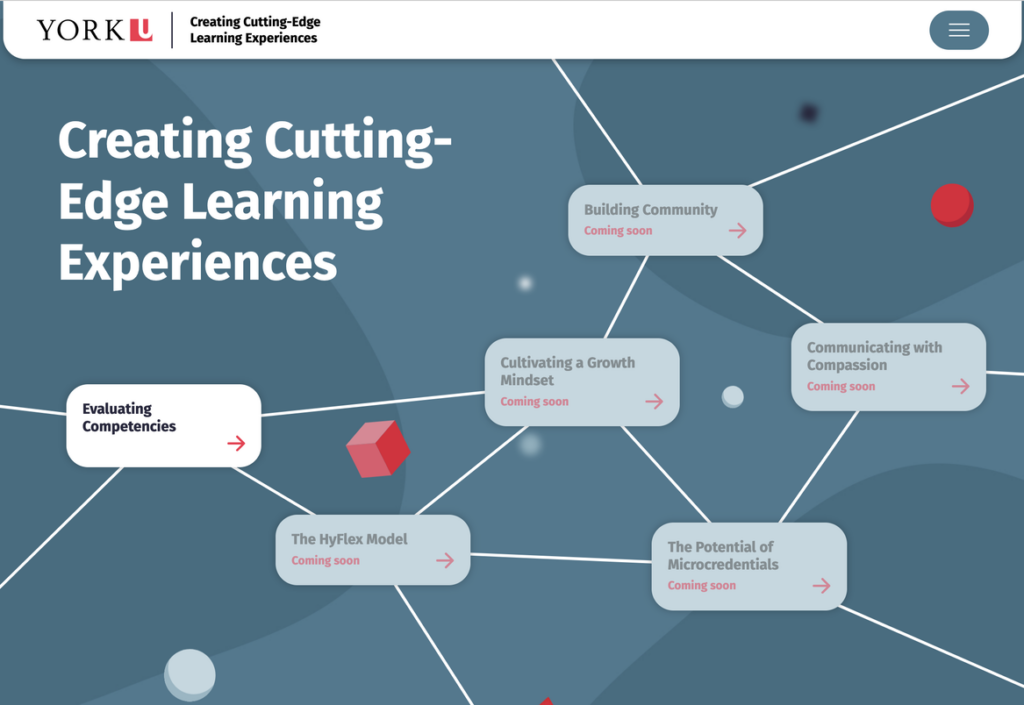By Elaine Smith
Although she realizes that faculty members across Ontario may never binge-watch professional development videos focused on learning innovations, Michelle Sengara hopes the learning modules being created will still be a hit with dedicated teachers.

Sengara, director of innovation for York University’s associate vice-president of teaching & learning, and her team are collaborating with Sandbox, Inc., a digital media agency with a specialty in e-learning, to turn evidence-based research about innovative teaching and learning methods into professional development modules. E-Campus Ontario is currently funding the development of these modules and it will be home to the finished products, making them available to teachers everywhere in the province.
“Our aim is to make these modules as catchy as the Explained series on Netflix, which explains large concepts in 20-minute episodes,” says Sengara. “We want to offer innovative content and innovative production values. We use animation and interviews to make professional development interesting and engaging.”
The research fuelling the project is derived from York’s perpetual course model project, an effort that explores innovative course design. Its aim was “to experiment with new ways of thinking about what we teach (curriculum), how we teach (pedagogy) and how we define and measure success (assessment),” said Sengara, who led the initiative. “Rigorous research carried out on these course prototypes has yielded incredible insights on the effective design, development, and delivery of instructional experiences.”
Based on the research, she and her team identified six topics that deserve further exploration in order to revolutionize online teaching and these professional development modules are an attempt to mobilize those knowledge assets in a more innovative and meaningful way:
- How to Build Community in Online Learning Settings;
- Micro-credentials: Designing Flexible Courses to Upskill and/or Reskill Learners;
- Cultivating a Growth mindset as Instructors;
- Competency-Based Evaluation: Alternative Assessment Models for Skill Acquisition;
- The Who, What, Where, When and Why of the HyFlex Instructional Method; and
- How to Use Affective Communication to Teach with Compassion.
They’ve also designed a template for the modules for consistency. Each will discuss what the topic is about, why it’s important and how to do it, giving the series coherence. In addition, the team is building the modules with an eye to academic integrity and robustness. They can be used individually, as micro-credentials or as a resource that can be used in other professional development courses or communities of practice; the opportunities are myriad.

During the pandemic, Sengara’s team and Sandbox worked to create the first module, building the foundation for an efficient and effective collaborative process, and did beta testing with users on the resulting video content. However, most of the interviews at the time had to be done on Zoom, so they are being redone in person to ensure that the finished product has more staying power. Since the first module has already been tested by potential users, the team can incorporate their feedback into this new version.
“That’s the development process,” said Sengara. “We learn and iterate. We plan to make the first two modules the blueprint for the others with the same structure and same animation. By testing and gathering feedback along the way, we’re able to brainstorm and see what other ways we can push boundaries and make the modules more innovative.”
The first two modules will be live on eCampus Ontario this spring, with the others to follow later this year. Not only will they provide educators with innovative instructional ideas, but they’ll offer Sengara and her colleagues the opportunity to collect data across Ontario about professional development and academic innovation.
“York will take the lead on collecting this data, in collaboration with the development team at Sandbox,” she said. “We want to publish and give presentations on the next frontier of professional development when it comes to teaching and learning in this digital and disruptive age.”
They also hope to obtain funding for professional translation to make the modules more accessible to French and Indigenous language speakers.
In addition, Sengara and her team have created a strong partnership with Sandbox Inc., one that reflects the priorities of the University Academic Plan and should allow the partners to “continue to produce relevant, meaningful professional development content.”
“We need ways to quickly produce relevant content and get new ideas into the system,” Sengara said. “We want to create just-in-time content so we can spark new ideas that are part of an ongoing professional development conversation.”


